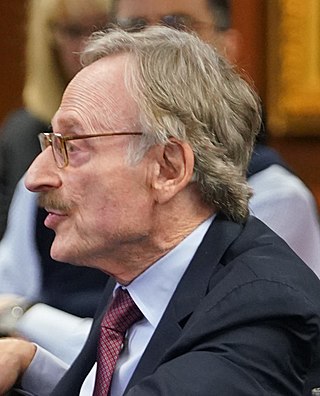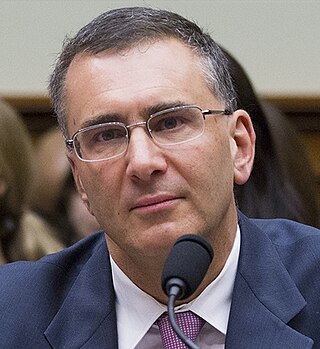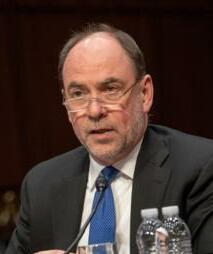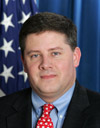
The Hoover Institution is an American public policy think tank and research institution that promotes personal and economic liberty,free enterprise,and limited government. While the institution is formally a unit of Stanford University,it maintains an independent board of overseers and relies on its own income and donations. It is widely described as a conservative institution,although its directors have contested the idea that it is partisan.

Nicholas Gregory Mankiw is an American macroeconomist who is currently the Robert M. Beren Professor of Economics at Harvard University. Mankiw is best known in academia for his work on New Keynesian economics.

The Children's Health Insurance Program (CHIP) –formerly known as the State Children's Health Insurance Program (SCHIP) –is a program administered by the United States Department of Health and Human Services that provides matching funds to states for health insurance to families with children. The program was designed to cover uninsured children in families with incomes that are modest but too high to qualify for Medicaid. The program was passed into law as part of the Balanced Budget Act of 1997,and the statutory authority for CHIP is under title XXI of the Social Security Act.

The Congressional Budget Office (CBO) is a federal agency within the legislative branch of the United States government that provides budget and economic information to Congress. Inspired by California's Legislative Analyst's Office that manages the state budget in a strictly nonpartisan fashion,the CBO was created as a nonpartisan agency by the Congressional Budget and Impoundment Control Act of 1974.
Budget reconciliation is a special parliamentary procedure of the United States Congress set up to expedite the passage of certain budgetary legislation in the United States Senate. The procedure overrides the filibuster rules in the Senate,which may otherwise require a 60-vote supermajority for passage by the Senate. Bills described as reconciliation bills can pass the Senate by a simple majority of 51 votes or 50 votes plus the Vice President's as the tie-breaker. The reconciliation procedure also applies to the House of Representatives,but it has minor significance there,as the rules of the House of Representatives do not have a de facto supermajority requirement. Due to greater polarization,gridlock,and filibustering in the Senate in recent years,budget reconciliation has come to play an important role in how the United States Congress legislates.
Bruce Reeves Bartlett is an American historian and author. He served as a domestic policy adviser to Ronald Reagan and as a Treasury official under George H. W. Bush. Bartlett also writes for the New York Times Economix blog.

Michael Jay Boskin is the T. M. Friedman Professor of Economics and senior Fellow at Stanford University's Hoover Institution. He also is chief executive officer and president of Boskin &Co.,an economic consulting company.

Edward Paul Lazear was an American economist,the Morris Arnold and Nona Jean Cox Senior Fellow at the Hoover Institution at Stanford University and the Davies Family Professor of Economics at Stanford Graduate School of Business.
Henry Stanislaus Rowen was an American national security expert,economist,and academician.

Jonathan Holmes Gruber is an American professor of economics at the Massachusetts Institute of Technology,where he has taught since 1992. He is also the director of the Health Care Program at the National Bureau of Economic Research,where he is a research associate. An associate editor of both the Journal of Public Economics and the Journal of Health Economics,Gruber has been heavily involved in crafting public health policy.

Kevin Allen Hassett is an American economist who is a former Senior Advisor and Chairman of the Council of Economic Advisers in the Trump administration from 2017 to 2019. He has written several books and coauthored Dow 36,000,published in 1999,which argued that the stock market was about to have a massive swing upward. Shortly thereafter,the dot-com bubble burst,causing a massive decline in stock market prices,though the Dow was soon to recover. It finally did reach 36,000 as the Covid pandemic receded in late 2021.

Jason Furman is an American economist and professor at Harvard University's John F. Kennedy School of Government and a nonresident senior fellow at the Peterson Institute for International Economics. On June 10,2013,Furman was named by President Barack Obama as chair of the Council of Economic Advisers (CEA). Furman has also served as the deputy director of the U.S. National Economic Council,which followed his role as an advisor for the Barack Obama 2008 presidential campaign.

Douglas James "Doug" Holtz-Eakin is an American economist. He was formerly an economics professor at Syracuse University,Director of the Congressional Budget Office,and chief economic policy adviser to Senator John McCain's 2008 presidential campaign. Holtz-Eakin is currently president of the American Action Forum policy institute,a conservative think tank.

Martin Anderson was an American academic,economist,author,policy analyst,and adviser to US politicians and presidents,including Ronald Reagan and Richard Nixon. Under the Nixon administration,Anderson was credited with helping to end the military draft and creating the all-volunteer armed forces. Under Reagan,Anderson helped draft the administration’s original economic program that became known as “Reaganomics.”A political conservative and a strong proponent of free-market capitalism,he was influenced by libertarianism and opposed government regulations that limited individual freedom.
Donald Baird Marron Jr. is an American economist,professor and policy advisor and director of the nonpartisan Urban-Brookings Tax Policy Center in Washington,D.C. He is the son of the economist and financier Donald B. Marron Sr.
The economic policy of the Barack Obama administration,or "Obamanomics" was characterized by moderate tax increases on higher income Americans,designed to fund health care reform,reduce the federal budget deficit,and decrease income inequality. President Obama's first term (2009–2013) included measures designed to address the Great Recession and subprime mortgage crisis,which began in 2007. These included a major stimulus package,banking regulation,and comprehensive healthcare reform. As the economy improved and job creation continued during his second term (2013–2017),the Bush tax cuts were allowed to expire for the highest income taxpayers and a spending sequester (cap) was implemented,to further reduce the deficit back to typical historical levels. The number of persons without health insurance was reduced by 20 million,reaching a record low level as a percent of the population. By the end of his second term,the number of persons with jobs,real median household income,stock market,and real household net worth were all at record levels,while the unemployment rate was well below historical average.

David Richard Henderson is a Canadian-born American economist and author who moved to the United States in 1972 and became a U.S. citizen in 1986,serving on President Ronald Reagan's Council of Economic Advisers from 1982 to 1984. A research fellow at Stanford University's Hoover Institution since 1990,he took a teaching position with the Naval Postgraduate School in Monterey,California in 1984,and is now an emeritus professor of economics.
Leonard "Len" E. Burman is an American economist,tax policy expert,and author. He is currently an institute fellow at the Urban Institute,the Paul Volcker Chair in Behavioral Economics at the Maxwell School of Citizenship and Public Affairs at Syracuse University,and a senior research associate at Syracuse University's Center for Policy Research. He is,with Joel Slemrod,the author of Taxes in America:What Everyone Needs to Know.
Sidney Lewis Jones is an American economist and former official in the United States federal government. Educated at Utah State University and Stanford University,he initially taught in universities until he was recruited to join the staff of the Council of Economic Advisers. From there he held a number of positions in and out of government,including senior roles in the Departments of Commerce and the Treasury. A Republican,he has held strong views during his career about controlling inflation and federal government spending but was nonetheless well regarded as an economist across the political spectrum.












